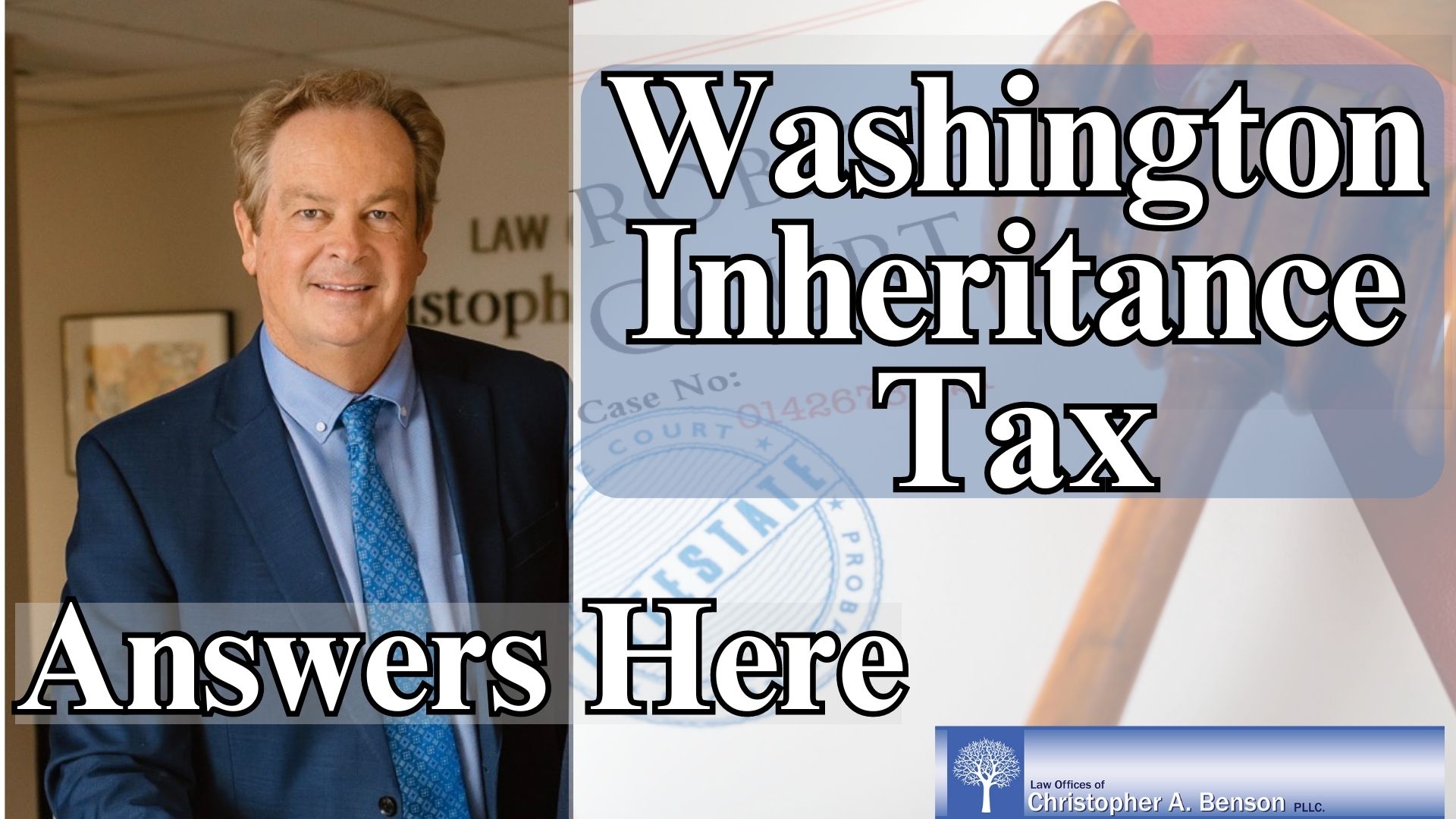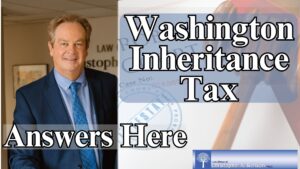

What is the Washington state estate tax rate? Inheritance tax?

A common question we receive is: Does Washington State have an inheritance tax or probate tax?
In the law, words matter. Therefore, as your read the answers and responses below, the end result might feel the same (i.e. pay a tax); but how you arrive at the result is technically different (what or who pays the tax).
I have found what people really want to know is: “If someone dies, is there ANY tax that has to be paid to the State of Washington?”
I’m going to give you the good news before your read the bad news below: The good news is that with a little bit of forethought and planning, most people can use the allowed exemptions and shelter their assets from Washington Estate Tax. However, you have to do things the right way with an estate planning attorney and tax professional who knows what they are doing. Spending a little bit of money now can save you A LOT of money in the future. The Law Offices of Christopher A. Benson, PLLC offers a free initial consultation regarding estate planning matters.
The source of the information below can be found in greater detail on the Washington State Department of Revenue website. I include the link at the end of this article.
Does the state of Washington have an inheritance or estate tax?
Washington does not have an inheritance tax. Washington does have an estate tax.
During a general election in November 1981, the voters repealed an inheritance tax and enacted an estate tax. The change from an inheritance tax to an estate tax became effective January 1, 1982. Due to this change, Washington no longer has an inheritance tax waiver.
In general terms, an inheritance tax is a tax on the beneficiaries of an estate whereas an estate tax is a tax on the decedent’s estate.
If you are a person living in Washington who inherits property or money, you do not owe Washington taxes on your inheritance.
What are the estate tax rates for deaths on or after January 1, 2014?
The tax rates range from 10 percent to 20 percent of the Washington taxable estate. The taxes are calculated on a graduated scale; each range is taxed at a different rate. The table below shows the range of tax by the value of the Washington taxable estate.
Table W: For dates of death on or after 1/1/2014
| If Washington Taxable Estate | The Amount of Tax Equals | Of Washington Taxable Estate Value Greater Than | ||
| Is at Least | But Less Than | Initial Tax Amount | Plus Tax Rate % | |
| $0 | $1,000,000 | $0 | 10.00% | $0 |
| $1,000,000 | $2,000,000 | $100,000 | 14.00% | $1,000,000 |
| $2,000,000 | $3,000,000 | $240,000 | 15.00% | $2,000,000 |
| $3,000,000 | $4,000,000 | $390,000 | 16.00% | $3,000,000 |
| $4,000,000 | $6,000,000 | $550,000 | 18.00% | $4,000,000 |
| $6,000,000 | $7,000,000 | $910,000 | 19.00% | $6,000,000 |
| $7,000,000 | $9,000,000 | $1,100,000 | 19.50% | $7,000,000 |
| $9,000,000 | $1,490,000 | 20.00% | $9,000,000 | |
Note: The Washington taxable estate is the amount after all allowable deductions, including the applicable exclusion amount.
How do I know what the Washington taxable estate is?
To determine the Washington taxable estate, take the gross estate and subtract any allowable expenses and deductions. The allowable expenses and deductions include such items as the decedent’s funeral expenses, costs of administering the estate, any debts of the decedent (mortgages, liens, outstanding bills), bequests to a spouse, gifts to charity, the farm deduction (if eligible), the qualified family-owned business interests deduction (if eligible) and the applicable exclusion amount.
What is the estate tax?
The estate tax is a tax on the right to transfer property at the time of death. A person residing in Washington or a non-resident who owns property in Washington may owe an estate tax depending on the value of their estate.
Who must file a Washington estate tax return?
The executor for a decedent’s estate is required to file an estate tax return if the gross estate meets the filing threshold for the date of death. See the Filing Thresholds and Exclusion Amounts table to determine if an estate tax return is required to be filed.
If the total gross estate is below the filing threshold, no estate tax return needs to be filed. If the total gross estate is above the filing threshold, an estate tax return must be filed even if no tax would be due.
Also, anytime a Federal Form 706 is required to be filed with the Internal Revenue Service, a Washington estate tax return must be filed. A copy of the Federal Form 706 must be included with the Washington estate tax filing.
What is the estate tax filing threshold?
The executor must file a Washington estate tax return if the decedent owned property in Washington state and the gross estate exceeds the following thresholds:
| Year Death Occurred | Filing Threshold (Gross estate) |
| May 17 – December 31, 2005 | $1,500,000 or more |
| 2006 and after | $2,000,000 or more |
Note: If the gross estate is over the filing threshold an estate tax return is required, even if no tax is due.
What is the estate tax applicable exclusion amount?
The applicable exclusion amount is an amount deducted prior to calculating estate tax due. Until December 31, 2013 the exclusion amount matched the filing threshold, but, as of January 1, 2014, it is adjusted annually using the Seattle-Tacoma-Bremerton metropolitan area October consumer price index.
For updated applicable exclusion amounts, see the Filing Thresholds and Exclusion Amounts table.
What assets should be included in the estate? Is it different for a married couple?
All assets owned by the decedent on the date of death should be included in the estate. All assets, even if located in another state, should be reported on the estate tax return (see the Estate Tax Apportionment for Out of State Property page).
For the estate of a married decedent, all of the community property and all of the decedent’s separate property are reported on the estate tax return. The community property assets are then reduced by 50% to reflect the decedent’s share of the property. Even if the entire estate will pass to the surviving spouse and no taxes may be due, an estate tax return must be filed if the decedent’s half of the community property plus the decedent’s separate property meets the filing threshold.
Do I have to include out of state property on the estate tax return?
Yes. All property owned by a decedent must be included on the estate tax return. Once the estate tax is calculated on the entire estate, as if all property is in Washington, then a calculation is done to apportion the tax between the Washington property and the out of state property.
The decedent’s state of domicile at the time of death is what determines if property is in state or out of state property. For a Washington domiciled decedent any tangible personal property located outside of Washington and any real property located outside of Washington are considered out of state property. For an out of state domiciled decedent all intangible property, any tangible property located outside of Washington and any real property located outside of Washington are considered out of state property.
A decedent’s share of property or interest in a limited liability company (LLC), limited liability partnership (LLP), corporation, or other type of business entity, operating for a true business purpose, is considered an intangible asset and is allocated to the state of domicile. When one of these types of entities is used simply to hold property and does not operate for a true business purpose, then the location of the property is used to determine whether it is in state or out of state property.
For more details see the Estate Tax Apportionment for Out of State Property page.
How do I value the assets in the estate?
All assets owned by a decedent are valued at their actual value or fair market value for the valuation date.
The “actual value” of an asset is its cash value or unpaid principal plus any interest accrued to the valuation date.
The “fair market value” is the price at which property would change hands between a willing buyer and a willing seller, neither being under any compulsion to buy or sell and both having reasonable knowledge of the relevant facts. The fair market value would be a sale in an arm’s-length transaction and never determined by a forced sale. Fair market value for a business entity would include any goodwill inherent in the business. For most stocks and bonds the fair market value is the mean between the highest and lowest selling prices quoted on the valuation date.
The “valuation date” is the date of death of the decedent. However, an alternate value date (six months after the date of death) may be elected; see the instructions for the estate tax return to determine if alternate value may be elected for an estate.
When filing the estate tax return, be sure to include all supporting documentation showing the actual or fair market value. Supporting documentation can include, but is not limited to, real estate appraisals, date of death brokerage statements, and business appraisals.
Source http://dor.wa.gov/Content/FindTaxesAndRates/OtherTaxes/tax_estatetaxfaq.aspx#rates2014
Over the past 32 years, the Law Offices of Christopher A. Benson has helped over 5,000 clients take control of their financial situation, develop a quality estate plan, protect their assets for their heirs and gain Peace of Mind. Call (253) 815-6940 to set up your free initial consultation for estate planning today.